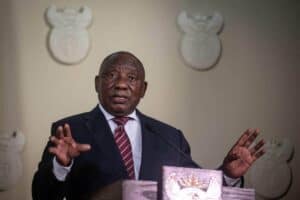Kolelas, 60, came in second to Sassou Nguesso in the last elections in 2016, picking up 15 percent, according to the official results.

Following are portraits of the two main candidates in presidential elections in the Republic of Congo on Sunday:
– Denis Sassou Nguesso –
A former paratroop colonel who swapped his combat uniform for fine tailored suits, President Denis Sassou Nguesso is the firm favourite.
A veteran survivor who holds a tight grip on the levers of power, he has accumulated more than 36 years in office — at 77, he is four times older than the average Congolese, whose median age is 19, according to UN figures.
“At these times of uncertainty, the people need men of experience. And I am putting my experience at the service of all the young,” he said on the campaign trail.
An ethnic Mboshi, Sassou Nguesso was born in Edou, 400 kilometres (250 miles) north of the capital Brazzaville, and joined the military as France’s colonial era in Congo ended.
He supported a 1968 movement that toppled president Alphonse Massamba-Debat and brought Marien Ngouabi to power.
Named head of a commando unit and then defence minister, Sassou Nguesso became the regime’s ideological head and co-founded the Marxist-leaning Congolese Labour Party (PCT) in 1969.
In 1979, two years after Ngouabi was assassinated, Sassou Nguesso became head of state.
He was forced to introduce multi-party elections in 1991 and was defeated in a presidential poll a year later. The decade that followed was wracked with civil war, from which Sassou Nguesso ultimately emerged victorious in 1997.
He has won every single election since then, in conditions that the opposition has slammed as fraudulent and thanks to a 2015 constitutional amendment that lifted a ban on presidential candidates older than 70.
He has also faced down challenges from rebels and brushed off accusations of rampant corruption and mismanagement of resources, especially in the state-run oil sector on which Congo heavily depends.
– Guy-Brice Parfait Kolelas –
Kolelas, 60, came in second to Sassou Nguesso in the last elections in 2016, picking up 15 percent, according to the official results.
The only serious contender left facing the president after a string of boycotts, withdrawn candidacies and exclusions, he revealed that he was seriously ill in a video posted from his sickbed.
“Go and vote for change, then I won’t have fought for nothing,” Kolelas told supporters, without saying what illness had struck him.
Nicknamed Pako, he is the fourth of 12 children who gained an education in economics in France and afterwards taught in French universities.
He belatedly entered politics on the advice of his father, Bernard Kolelas, an ex-mayor of Brazzaville and former prime minister who fled to Mali with his family in 1997 when Sassou Nguesso fought his way back into power.
“It was when we were in exile that my father asked me to pursue the political struggle,” Kolelas said at a recent rally.
He returned to Congo in 2005 for the burial of his mother.
Two years later, the MCCI party founded by his father in 1990 signed a deal with Sassou Nguesso’s PCT, and in 2009 the younger Kolelas joined the government as fisheries minister, later becoming minister for public services.
But he distanced himself from Sassou Nguesso by opposing changes to the constitution enabling the president to seek a further term in office.
In the runup to the 2016 election, Kolelas founded his own party, the Union of Democratic Humanists, or UDH-Yuki.
Two candidates, former general Jean-Marie Michel Mokoko and former minister Andre Okombi Salissa, disputed Sassou Nguesso’s victory.
They were arrested, put on trial and each handed 20 years in jail on charges of undermining state security.
“I simply noted the result of the elections, but I have never acknowledged them. Because logically there would have been a runoff vote between me and General Jean-Marie Michel Mokoko,” Kolelas has said.
He has vowed to free Mokoko if he wins on Sunday — a scenario that analysts say is unlikely.
Kolelas was supported in 2016 by a former rebel chief, Frederic Bintsamou, alias Pastor Ntumi, who like him hails from the Pool region in southern Congo.
After Bintsamou disputed the results, Pool erupted into violence, which ended the following year.
For more news your way, download The Citizen’s app for iOS and Android.






